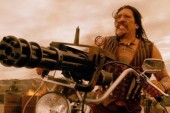
Image: Flickr Back when he was an ambitious film student at NYU, Martin Scorsese was assigned to write a treatise on any film, and chose The Third Man. It’s impossible to read that essay now (though sadly I have to assume it’s better than mine…Sigh…), but Scorsese did reveal that he received a B+ on the paper, with a note from the professor stating, “Forget this, it’s just thriller.” How times have changed.
Yes, The Third Man is a thriller, but that is in no way a bad thing. In fact, it’s one of the finest thrillers ever produced and taken on those terms as close to a perfectly made movie as exists. A slice of post-WWII European paranoia with stumbling/sinister Americans abroad, the lost art of black and white cinematography, the cinema-chewing talents of Orson Welles, and the single greatest advertisement for the hypnotic joys zither music. It’s one of those classic films that feels instantly recognizable to viewers who have never seen it. Over 60 years of rip offs, homage and unconscious influence have caused the masterpiece to slither into the public consciousness. Thankfully, The Third Man is good enough to withstand that classic status; a thriller as flawlessly and tightly crafted as a ludicrously expensive Swiss watch, or perhaps even a cuckoo clock.
Joseph Cotton stars as Holly Martins, a pulp Western novelist somehow invited to Vienna to give a lecture to a serious literary group. No one seems to know of his work other than a local police Maj. Calloway (Trevor Howard), who has some unexpected news to pass along to the author. Holly’s longtime friend Harry Lime died in the city shortly before his arrival. Something seems fishy from the start and this being a corrupt Post-war Vienna where the black market ruled the crumbling streets, there are plenty of secrets to be uncovered by those willing to look. Holly soon stumbles through the collection local eccentrics and articulate scumbags involved in Harry’s mysteriously shady racket and ends up getting involved with one of his former ladyfriends (Alida Valli). It’s not much of a spoiler to reveal that Lime in fact faked his death and arrives in a movie-stealing cameo from Orson Welles, portraying that special brand of evil that comes along a smile.
It’s hard to know where to start when expounding on the joys of the film, but I suppose Welles is a good enough place to kick things off. He’s on screen for somewhere between five to 10 minutes, yet feels like the star when the screen goes black. Every scene involves a conversation about Lime and when he finally arrives, Welles milks the reveal like few actors could. A band of light catches his face in a shadowy doorway and Welles flashes an evocatively wry grin like a schoolboy caught with his hand in the cookie jar. Of course, he’s caught for far more serious crimes, but Welles never plays the role like an obvious villain. He’s a far more disturbingly modern figure, a charming intellectual criminal getting rich off of taking advantage of those still suffering from the war. His second famous scene is a monologue on a Ferris Wheel, looking down on the “little dots” of people below and speaking of them potential tools for wealth rather than human beings. The speech wraps up with the most famous line in the film, “In Italy for 30 years under the Borgias they had warfare, terror, murder, and bloodshed, but they produced Michelangelo, Leonardo da Vinci, and the Renaissance. In Switzerland they had brotherly love, 500 years of democracy and peace, and what did that produce? The cuckoo clock.” The speech was improvised by Welles, tossed off and slotted into the movie in the moment, rather than by design. The role became instantly iconic for Welles and he followed it up with a series of radio plays following the further adventures of Harry Lime. So large does his presence loom over the film that some are convinced he worked as ghost director, which is unfair to the actual director Carol Reed.
Indeed, Reed never made another film quite as strong as The Third Man, but as Welles would be the first to admit, you only need one masterpiece to make a career. Working from a script by legendary author (and occasional spy) Carol Reed, it’s a brilliant mystery of corruption in a battle-scarred Europe. Like a film noir, no one is trustworthy and the historical setting is suited to the moral ambiguity. Had Reed taken producer David O. Selznick’s advice, Cary Grant would have played Lime and the film would have been shot in a studio rather than on location (an unconventional choice at the time). Vienna is practically a character in the film, a maze of cobblestone alleyways and bomb-ravaged streets mirroring the confounding mystery of Harry Lime. Reed also shot in gorgeous black and white, with the characters poking out through shadows and almost every shot framed on a canted angle to underline the fractured truth of the tale. Some point to the remarkable visual style as an indication of Welles’ involvement behind the camera. However, the style is reminiscent of countless other period thrillers also influenced by Welles’ deep focus photography and while Reed may never have matched it, he also never shot a film so dark and in a city so suited to that visual approach again.
Greene’s snappy wordplay and dark cynical themes mixed perfectly with Reed’s showy visual approach, while every actor fit their role like a tailored pair of slacks. Yes, Welles steals the show, but his longtime Mercury Theatre player Joseph Cotton works his grizzled charms and subtle sense of humor to perfection as Holly, while Alida Valli plays one of the few innocent femme fatales, and Trevor Howard brings that special brand of stiff-upper lip British gentleman hero to a possibly thankless lawman role. The crucial final touch was Anton Karas’ haunting zither score, a substantial radio hit when the film was released. Unplanned, the score was commissioned when Reed spotted Karas playing in a restaurant on location. The music is as evocative and unique as the film that contains it and like so much of what makes The Third Man special, joined project almost by accident. Filmmaking is too much of a collaborative medium to be carefully plotted out to perfection. It’s more of a chemistry experiment or a roll of the dice and the talented folks behind The Third Man were lucky enough to hit the jackpot. Sure, it may just be a thriller, but my oh my, what a thriller.
The Third Man will screen at the The Bell Lightbox at 7 p.m. on May 14, 2012.
_____
Phil Brown writes about classic films for Toronto Standard‘s Essential Cinema column.
For more, follow us on Twitter at @TorontoStandard and subscribe to our newsletter.














